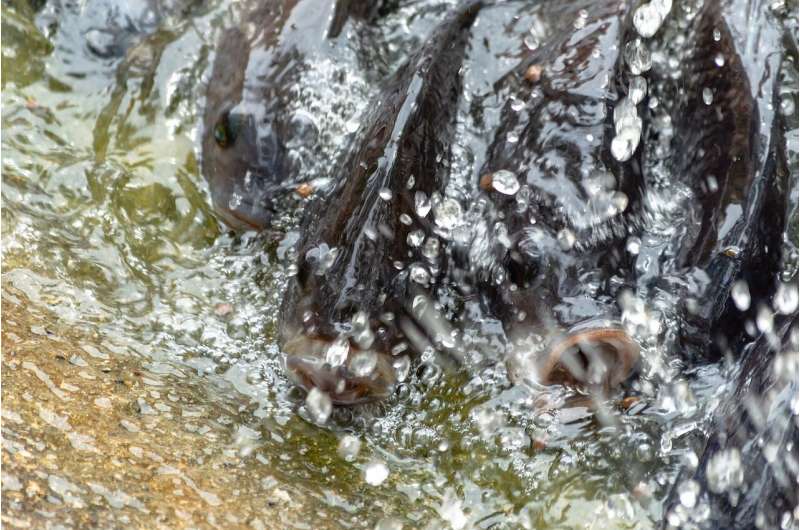This article has been reviewed according to Science X's editorial process and policies. Editors have highlighted the following attributes while ensuring the content's credibility:
fact-checked
trusted source
proofread
Study provides genomic resources to help boost climate resilience of fisheries

Candidate genes that could help fish to tolerate warmer and saltier water have been identified in new research from the Earlham Institute, potentially providing a vital resource to guide breeding programs in freshwater aquaculture.
As water quality and availability is reduced by higher global temperatures, these insights can be used to breed more resilient fish and safeguard a key source of food for millions of people.
The Nile tilapia, Oreochromis niloticus, is widely farmed in freshwater aquaculture, providing essential nutrients and protein. Their use in aquaculture has risen dramatically, largely due to their adaptability to different water conditions and production systems.
Soaring global temperatures, however, have depleted freshwater resources. Fish farms—and the people who rely on them for food—urgently need strains that can still thrive despite the higher salinity and increased water temperature.
To address this issue, researchers at the Earlham Institute, University of East Anglia, and University of Stirling have explored the tilapia genome to locate advantageous changes in the genome responsible for an increased tolerance to changing water conditions.
They examined tissue taken from the gills—an important osmoregulatory organ in fish—and generated DNA and RNA sequence data to study the activity, regulation, and function of different genes. They then identified genetic differences at gene regulatory regions in the Nile tilapia and 27 other tilapia species.
Their assumption was that differences between the Nile tilapia, a freshwater species, and species adapted to saline waters are likely to have arisen to control genes involved with adapting to different water environments.
The team optimized a genome sequencing approach that reveals the activity of potential transcription factor binding sites and genetic switches for turning expression on and off.
Their approach identified regions of the genome they believe are responsible for controlling the activity of certain osmoregulatory genes, which in turn influence the function of the gills and how the fish responds to changing water conditions.
They identified a number of genes relevant to traits that help tilapia to tolerate saltier water and also acclimatize to freshwater. These included genes involved in metabolism and general housekeeping processes responsible for reacting to environmental changes in order to maintain balance.
Dr. Tarang Mehta, study author and postdoctoral research scientist at the Earlham Institute, said, "Breeders are in desperate need of genomic resources to inform their breeding programs so traits offering greater resilience can be quickly and accurately selected for."
"By characterizing the genes responsible for these desirable traits, we can now share these new resources with freshwater fish farms to help guide selective breeding programs."
Dr. Wilfried Haerty, study author and Group Leader at the Earlham Institute, said, "We identified regions of the Nile tilapia genome we can target to help breed fish with higher tolerance to salt—something that has sadly become increasingly important as our freshwater resources are degraded."
"The next steps are to use similar genomic approaches to find genes and their regulators associated with other traits of interest for aquaculture, like growth and disease resistance"
The input of the Genomics Pipelines Group at the Earlham Institute was critical in the data generation, including preparation of RNA-Seq libraries, pooling, and sequencing.
"Chromatin accessibility in gill tissue identifies candidate genes and loci associated with aquaculture relevant traits in tilapia" is published in the journal Genomics.
More information: Tarang K. Mehta et al, Chromatin accessibility in gill tissue identifies candidate genes and loci associated with aquaculture relevant traits in tilapia, Genomics (2023). DOI: 10.1016/j.ygeno.2023.110633
Provided by Earlham Institute




















